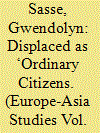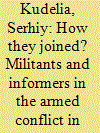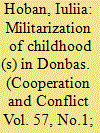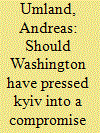| Srl | Item |
| 1 |
ID:
171689


|
|
|
|
|
| Summary/Abstract |
Based on original survey data, this essay analyses the political attitudes of individuals displaced by the war in eastern Ukraine. We systematically compare attitudinal differences and similarities along three axes: the displaced relative to the resident population; the displaced in Ukraine relative to the displaced in Russia; and the displaced from the (non-)government-controlled areas relative to the resident population in the (non-)government-controlled areas of Donbas. This fine-grained comparative analysis highlights the variety of attitudes held by the displaced, similarities in attitudes across displacement locations, and the effect of war casualties on attitudes and self-declared political interest.
|
|
|
|
|
|
|
|
|
|
|
|
|
|
|
|
| 2 |
ID:
187677


|
|
|
| 3 |
ID:
165193


|
|
|
|
|
| Summary/Abstract |
The effectiveness of recruitment strategies is crucial for sustainability of any insurgent campaign. This paper identifies eight mechanisms used to encourage overt and covert participation in the armed conflict in Donbas and shows that they varied depending on the type of service expected from a recruit. It relies on the original dataset compiled from studying 798 court cases of insurgents and informers convicted in Ukrainian courts in the period from October 2014 to March 2017. The paper finds that militants were more responsive to contractual or hierarchical mechanisms of recruitment, while informers who provided cover support were more likely to join through ideological appeals or activation of prior social ties.
|
|
|
|
|
|
|
|
|
|
|
|
|
|
|
|
| 4 |
ID:
184043


|
|
|
|
|
| Summary/Abstract |
This essay critically examines how the militarization of childhood(s) takes place in the Luhansk and Donetsk People’s Republics. The intensification of hostilities in Eastern Ukraine in mid-2014 has had a profound impact on local populations, particularly children. While no systematic recruitment and participation of children in conflict has been reported, childhood has become what Agathangelou and Killian would characterize as a ‘site for displacement and maneuvering for militarization.’ Drawing on feminist methodologies, I examine processes of the militarization of children’s everyday lives. This article investigates a range of ways in which authorities of proto-states in the Donbas region address children as participants and potential collaborators in the processes of militarization. In my analysis, I examine how war and preparation for it are simultaneously co-constituted by the geopolitical—legitimation of new proto-states—and everyday practices, such as engaging with school curricula, visiting museums, and (re)inventing historical narratives. Understanding of mechanisms that militarize childhood and how children become subjects and objects of militarization allows for a critical analysis that reveals spaces of everyday violence. This article, therefore, enhances our understanding about the intersections of childhood, militarism, and security.
|
|
|
|
|
|
|
|
|
|
|
|
|
|
|
|
| 5 |
ID:
146332


|
|
|
|
|
| Summary/Abstract |
This essay explores Russia’s involvement in the conflict in the Donbas by examining the extent to which Moscow’s contribution has demonstrated a governance approach. We argue that Russia’s engagement has remained in a perpetual state of flux due to contradictions in its policy, shaped by the interaction of a complex set of competing security logics. Opposing the view that Russia’s response is solely a policy of destabilisation, we put forward the view that Moscow’s behaviour has not ruled out a positive engagement in the settlement through the selective practice of certain norms and processes underpinning a governance approach.
|
|
|
|
|
|
|
|
|
|
|
|
|
|
|
|
| 6 |
ID:
186388


|
|
|
|
|
| Summary/Abstract |
This article was submitted in late 2021, and became dated after Russia's demonstrative preparation as well as start of an open, large-scale invasion of Ukraine early 2022. We nevertheless publish this commentary here in order to document the debate about the events leading to the escalation. No adaptations to the original 2021 article were made after the outbreak of high-intensity war on 24 February 2022. Avoiding a larger military escalation in the Russian–Ukrainian conflict is an important aim. Yet, historical experience suggests that concessions by Ukraine or its Western partners toward Russian revanchist aspirations in the Donbas may not help achieve it. On the contrary, Western softness, and Ukrainian weakness vis-à-vis the Kremlin will lead to further confrontation.
|
|
|
|
|
|
|
|
|
|
|
|
|
|
|
|
| 7 |
ID:
182507


|
|
|
|
|
| Summary/Abstract |
The pro-Russian protests that spread across the east and south of Ukraine in the aftermath of the Euromaidan Revolution set largely similar regions on starkly different trajectories. While Donbas saw a successful rebellion and later slid into war, Kharkiv and Dnipropetrovsk managed to avoid a separatist scenario. In this article, I examine the critical early stages of the pro-Russian unrest and argue that the initial success of the separatist rebellion in Donbas and its failure in Kharkiv and Dnipropetrovsk can be best explained by the differences in elite strategies and civil society organisation in the respective regions.
|
|
|
|
|
|
|
|
|
|
|
|
|
|
|
|
| 8 |
ID:
186085


|
|
|
|
|
| Summary/Abstract |
Conflict has urbanized because half the human population now lives in cities that offer insurgents the best protection from advanced weaponry. However, to understand the increased chance of inter-state urban warfare, it is necessary to consider a third factor: the reduction of force size. As a result of downsizing, state forces are no longer large enough to form fronts, as they did in the twentieth century. Consequently, even in inter-state wars, forces are also likely to converge on urban areas where the most important strategic, operational, and tactical objectives are located.
|
|
|
|
|
|
|
|
|
|
|
|
|
|
|
|